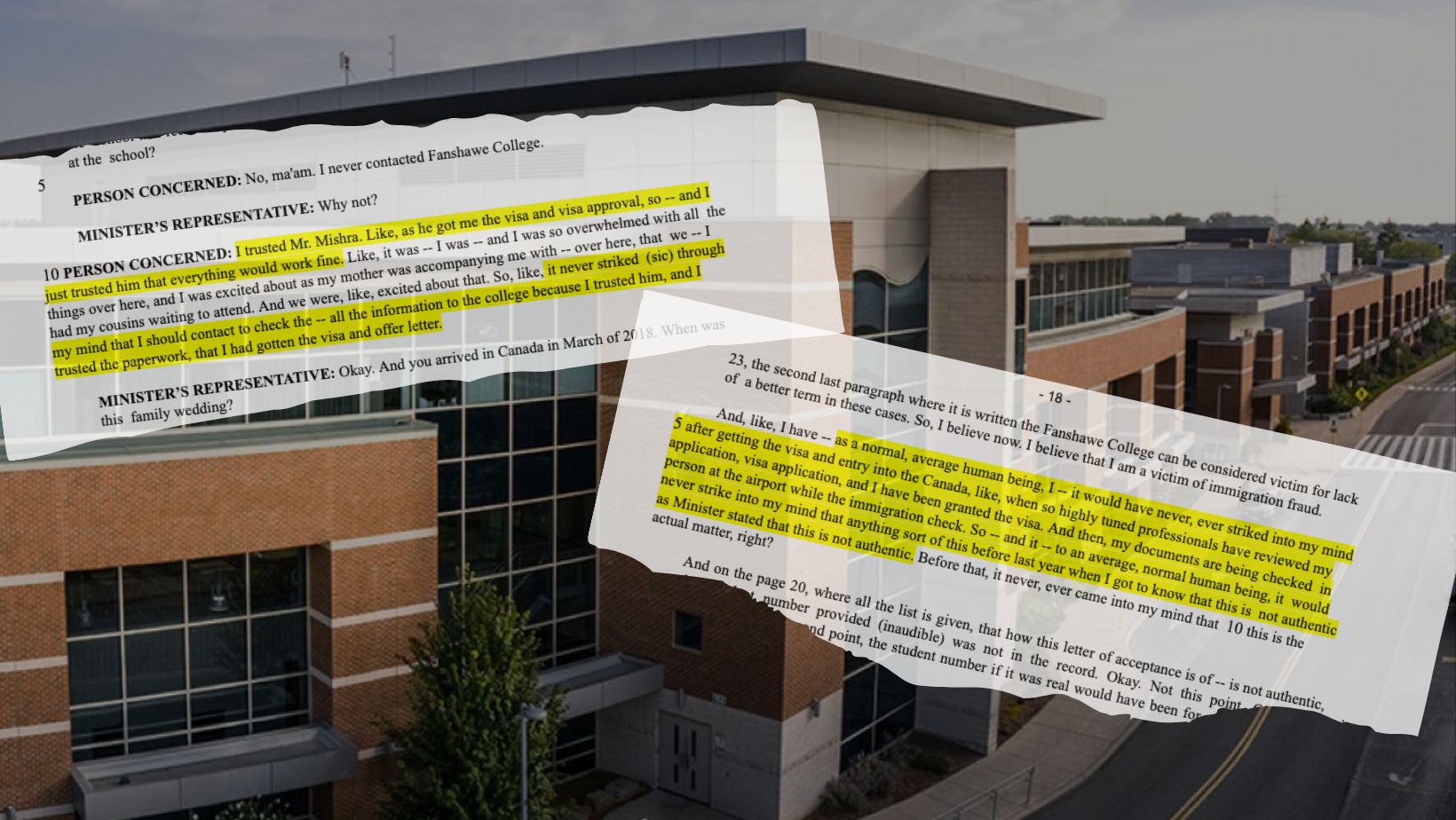A number of international students from India who were allegedly scammed by their immigration consultant into entering Canada with fake college acceptance letters are being asked to leave the country after years of studying and working here.
Canadian immigration officials have not confirmed how many students are impacted but reports in Indian media, including the Times of India, suggest up to 700 students could face removal orders.
In an emailed response to New Canadian Media, the Canada Border Services Agency (CBSA) declined to answer questions but confirmed that investigations are ongoing.
“CBSA can confirm that there are a number of active Immigration and Refugee Protection Act investigations into cases of misrepresentation, including those related to study permits,” they wrote. “As these are ongoing investigations, it would be inappropriate to comment further at this time.”
For this article, New Canadian Media acquired a copy of one of the affected students’ immigration tribunal hearings, and interviewed a lawyer who represents 36 of the students and a B.C. member of parliament who has heard from at least 50 impacted people.
These immigrants alleged that they trusted an immigration consultant in Jalandhar, Punjab—who is now wanted by Indian authorities—to apply to Canadian post-secondary institutions and for study permits on their behalf.
The students were granted these permits and lived in Canada for years before they were confronted by CBSA notifications that their college acceptance letters were fake and they may be asked to leave the country.
Now, many are looking for ways to stay in Canada, but the results of an immigration board proceeding last year that involves one of the consultant’s alleged victims suggests the students have a difficult road ahead.
‘I trusted him’
Hearing transcripts from the Immigration and Refugee Board show that in 2018, Rajveet Singh arrived in Canada with a study permit issued by the Canadian government after he submitted an acceptance letter to Fanshawe College that was found to be fake in 2021.
Singh—who represented himself at a virtual hearing in May 2022—testified that his immigration consultant, Brijesh Mishra, handled his visa application process, decided which college Singh would attend based on his stated program and location preferences, and provided him with his acceptance letter and study permit.
“He has provided me with the visa, so I trusted him and believe [sic] that it is a normal thing,” Singh said, stating that he had paid Mishra around CAD $13,000 for his services and for tuition to Fanshawe College.
But after Singh arrived in Ontario, he testified that Mishra stopped answering his calls and eventually told Singh that classes were full for the semester and that he’d get a seat next semester. Singh said he believed Mishra as this was not an uncommon occurrence in India.
After a year went by without a college admission, Singh said he grew suspicious of Mishra and switched to a different Indian immigration consultant who enrolled him in a smaller Ontario institution. Singh then lived and worked in Canada—after being granted a work permit as a temporary resident—for three years before he was notified by the CBSA that his original acceptance letter had been fake.
Until he was contacted by the CBSA, Singh said he did not question the legitimacy of his stay in Canada, trusting not only Mishra but also the judgment of Canadian immigration officials who issued his visa and checked his documents upon arrival at Toronto Pearson Airport in 2018.
“As a normal, average human being…it would have never, ever striked [sic] into my mind after getting the visa and entry into Canada, when so highly tuned professionals have reviewed my application, visa application, and I have been granted the visa,” Singh said.
After hearing both sides of the testimony, Natasha Gulamhussein, a member of the Immigration Division of the Immigration and Refugee Board of Canada put the onus on Singh, and ordered Singh’s removal from Canada on the grounds of misrepresentation.
“Mr. Singh chose to rely on his consultant,” Gulamhussein said. “It was his responsibility to ensure that his application was truthful and complete and he was negligent in performing that duty. He could have taken steps to verify the authenticity of the declaration that he had been accepted to Fanshawe College and/or the letter of acceptance, but he did not.”
An exclusion order was issued against Singh, barring him from entering Canada for five years unless he successfully obtains written consent from an immigration consultant. Singh was then informed of his recourse: seeking a judicial review of this decision in Federal Court.
“I hired Brijesh Mishra as a consultant, a professional in immigration matters, for this thing and borrowed money, invested my dad’s and my savings, and took a risk which I think has flipped my life and my family’s life upside down,” Singh said in his testimony.
According to Jaswant Singh Mangat, a Mississauga-based immigration lawyer, and MP Ken Hardie, at least a few dozen international students have also recently learned that they were scammed by the same immigration consultant, and must undergo the same process as Singh.
The role of governments
Out of the 36 international students Mangat represents, he said so far three have met the same fate as Singh at their immigration tribunal hearings and have gone on to challenge their removal orders in Federal Court. The other 33 are waiting for upcoming scheduled hearings.
According to Mangat, all of his clients were granted post-graduation work permits and had been living in Canada for over four years before they were notified, during their permanent residency applications, of their fraudulent college acceptance letters. His clients entered Canada through study permits based on these fake offer letters to Ontario-based colleges like Humber, Seneca, and Fanshawe.
“The CBSA or the IRCC discovered in the PR application that the college offer letter that was sent to New Delhi for a student visa was fake,” Mangat said. “It was just printed in India and attached.”
Mangat said his clients detailed the same experience with their immigration consultant as Singh: once they arrived in Ontario, the students were told their colleges were full for the semester and made to enroll in smaller institutions—ones that are not designated to accept international students.
Mangat said his clients were aware of at least 150 other students from Punjab who were recently told their initial college acceptance letters had been faked by the same consultant.
On a May 17 Facebook post about the situation, Liberal MP Ken Hardie asked students to reach out to him, offering his support. Within a couple of days, he said he spoke to roughly 50 people who face removal from Canada.
“I have heard from a fair number of them who claim to have been victimized by this specific consultant,” Hardie said. “The consultant had them sign the application forms, rather than signing it for them as their representative, so if fraud is detected and your signature is on the form, of course, then you’re accountable for it.”
Hardie considers his role right now as a go-between for students and IRCC, and said he is working to inform people of their rights and options. Though Hardie contends that Canada could tighten up its verification process before granting study permits, he put much of the onus for this situation on the Indian government.
“The government of India has to step up, and start regulating these people and enforcing, because it’s an ongoing battle with these people who call themselves consultants and they’re there just to cheat people out of their money,” Hardie said. “Then it’s left to us to try and clean up the mess in Canada when things like this happen.”
In India, the Deputy Commissioner of Jalandhar, Punjab issued a notice, seen by New Canadian Media, to suspend Brijesh Mishra’s license to practice his business and summoned him to appear in person to defend his practices.
According to Indian media reports, Mishra’s license to operate his consultancy firm, Education Migration Services, was cancelled as a consequence of him not appearing in person. Jalandhar Police are investigating Mishra through their Anti-Human Trafficking Unit.
“In our hearts, we would like to be lenient to people who have been victimized,” Hardie said. “At the same time, we can’t send a signal that we’ll be lenient to people who are involved in a fraudulent transaction, whether or not they’re victims, or whether they’re actively a part of it. So this is difficult and we want to do the right thing and the fair thing, but Canadians also want us to keep our system’s integrity intact.”
For his part, Singh testified at his hearing that he never intended to defraud the Canadian government.
“I paid [Mishra] the money—so much money—so I trusted that if I hired him, he is doing all the work for me,” Singh said. “He has provided me with the visa, so I trusted him and believe that it is a normal thing.”

Shlok Talati
Shlok Talati is a graduate student of journalism at the University of King's, Halifax. He has previously reported as a multimedia journalist from his hometown in India, and he continues to work as one in Canada.





Very nice article.. Heart touching and deep narrations of the situation
Very nice article heart touching